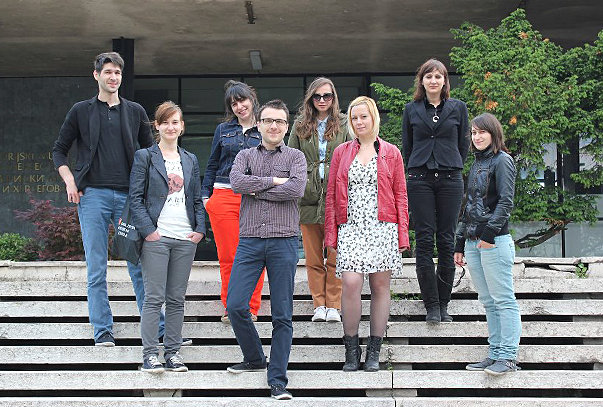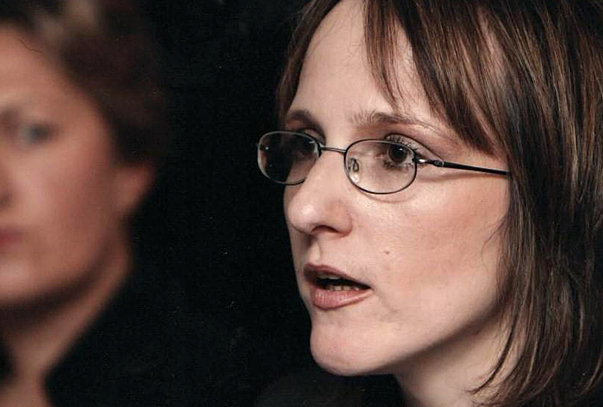By Mladen Lakić, Aleksandra Tolj
Damir was 18 years old when he told his mother that he was gay. Her response was to tell him he was sick and abnormal.
“She said she’d rather die than accept me that way,” recalled Damir, now in his early twenties. “She said that as long as we lived, this would never be accepted as something normal.”

Damir, who lives in a small town in the Federation, one of the two administrative entities of Bosnia and Hercegovina, BiH, has never even considered telling his father.
“He’s said lots of times that faggots are sick people who should be killed, and that he himself would kill someone if he knew they were gay,” Damir continued, looking at the floor.
Such reactions are not unusual in a country where the lesbian, gay, bisexual and transgender, LGBT, community, continues to be a marginalised and almost invisible group.
Recent years have seen a number of homophobic incidents, and public figures making outspoken hostile remarks about LGBT people. Many say that compared with the other social and economic challenges facing Bosnia, gay rights are far from a priority.
“Here in Bosnia, the word ‘faggot’ [‘peder’] is constantly used to describe someone bad. The referee who shows a red card to a football player is a faggot; the government official responsible for small pensions is a faggot; an annoying clerk who asks people to bring in more documents is a faggot,” said Damir, who asked for his own identity to be withheld.
He said he could not begin to imagine what his life would be like if his sexual orientation were revealed.
Prejudice exists in both private and public spheres. Experts say LGBT people are often victims of violence from family members, but in most cases are afraid to report the abuse to the authorities. Instead, they keep their trauma to themselves.
So some are abused and humiliated daily, beaten, thrown out of their homes or blackmailed with threats to tell their colleagues or other relatives about their sexual orientation, thus destroying their lives.
In this climate, websites are the safest places to communicate and socialise.
“I have to fulfil my emotional needs by communicating on the internet with other gay people, who, just like me, have no other option,” said Damir.
Asked whether it was possible for gay people in Bosnia to have a relationship, Damir said that although not easy, it was possible.
“We often have to hide and lie, or find a way to explain to friends and family who ‘that boy’ they see us with is,” he said. “In public places we act as if we were just mates, two guys who go for a beer together.”
Damir said public displays of affection were unthinkable.
“If you don’t want to cause problems, you should keep intimacy away from the public eye. We know we would get beaten up for that, and who knows what else. That’s how things are here. It might change in a few years, but that’s how it is now,” he added.
RIGHTS ACTIVISTS AT RISK
Campaigners who fight for the rights of the LGBT community in BiH are not safe, either.
Members of the Okvir association, which was founded in 2011 and offers support to LGBT community, were recently attacked in front of the BiH presidency building in central Sarajevo. On March 24, a dozen young men aged between 18 and 25 attacked a group of Okvir activists demonstrating outside the presidency. They yelled insults like “Kill the faggots!” until police finally stepped in.
The incident was barely reported in the Bosnian media.
Okvir activist Belma Steta recalls the problems she and her colleagues had when they wanted to rent offices for the association.
“No one would rent us an apartment when they found out we were LGBT activists. As soon as the landlords learned that we were an LGBT association, they’d cancel our contract,” she said.
Even now, their offices do not bear the organisation’s logo. “It’s safer that way,” Steta explained.
Prejudice extends into many areas of ordinary life. In April 2012, at a blood donation event at Sarajevo university, a librarian and a medical worker verbally and physically attacked three students who pointed out discriminatory wording on the donor form. The document stated that anyone who was in occasional or permanent contact with homosexuals was forbidden from donating blood.
The section has now been removed from the form, thanks to the efforts of a number of NGOs, but only in the Federation. Bosnia’s other entity, Republika Srpska, which uses the same form, has not yet changed it.
Public officials have been outspoken in their opposition to gay rights.
In September 2007, Milorad Dodik, then prime minister of Republika Srpska, and now its president, told the local media he “would never allow gay people into my cabinet”.
In July 2009, the Bosnian daily SAN published a controversial interview with Emir Kadric, the director of the student centre of Sarajevo university, in which he said that “homosexuals should build their own dormitories, far away from the existing ones”.
“I have no interest in homosexuals and I don’t want to have anything to do with those people. I don’t want them in student dormitories,” SAN reported Kadric as saying.
Events like Gay Pride marches, commonplace in many western capitals, are far more problematic in BiH.
When plans for a gay festival, to be called Queer Sarajevo, were announced in 2008, there was widespread public anger.
In an interview with Radio Free Europe, lawmaker Bakir Izetbegovic – now a member of BiH’s tripartite presidency – likened the event to “Sodom and Gomorrah”. He also expressed anger at the event being scheduled during the Muslim holy month of Ramadan.
Posters saying “Kill Faggots” appeared in public places across Sarajevo, adding to an atmosphere that many in the LGBT community saw as an open call for violence against them.
When Queer Sarajevo finally opened with an inaugural event at the Academy of Fine Arts on September 2008, groups of football fans, Islamic extremists and hooligans threw stones at the building, and even followed visitors as they left the exhibition and assaulted them.
After this attack, the organisers decided to make the festival a private function, changing the location of some events and cancelling many others.
“The level of homophobia in our society has isolated the LGBT community even more,” Azra Causevic, an activist with Okvir, said. “We are currently working on strengthening capacities within this community, so that we will be stronger and more visible through art and other activities in BiH public life.”
Activists say their cause would be greatly helped if at least one high-profile LGBT person revealed their true sexual orientation, but that has never happened.
MAKING LEGISLATION WORK
BiH has some legislation that touches on issues of gender and sexuality. The Law on Sexual Equality forbids discrimination based on sexual orientation; the Law on the Prohibition of Discrimination covers prejudice on the grounds of sexual expression or orientation; and the Registry Law was recently amended to allow sex changes to be shown in public records.
Criminal legislation in RS and in the Brcko District, an independently administered area, count acts that occur because of a person’s sexual orientation as hate crimes. This provision has not been introduced in the Federation yet, although legislative amendments were suggested in 2010.
Vladana Vasic, a programme coordinator with the Sarajevo Open Centre, an NGO that offers legal advice and documents cases of discrimination and violence against LGBT people, argues that the laws themselves are not the main obstacle to change.
“The legal framework in BiH is relatively good, but the biggest problem is that laws are not being implemented,” she said.
According to Vasic, criminal law provisions in Republika Srpska and Brcko are deployed more often than the 2008 anti-discrimination law, as victims, lawyers and judges often do not know how to use it properly.
In any case, very few victims take cases to court, because of the risk it will bring them to more difficulties.
“The biggest problem is that not many LGBT people want to talk openly about their sexual orientation. They rarely talk about it with friends and family, still less so in public,” Vasic said. “The legal process entails more attention, which results in exposing the person’s sexual orientation, so they choose not to fight for their rights publicly.”
The Sarajevo Open Centre has recorded five cases of discrimination against LGBT people, some of them involving state officials as perpetrators. One case is due to go to court, but its details cannot be made public. The outcome of the other four is still uncertain because the victims are reluctant to proceed, either because they do not believe they will get justice or because they do not want their sexual orientation to become known.
“MORE IMPORTANT PROBLEMS” THAN GAY RIGHTS
A straw poll of passers-by in Sarajevo – all of whom asked to remain anonymous – indicated that many people do not see this prejudice as an immediate priority.
“I think there’s more talk about discrimination than there is actual discrimination,” said one young man.
“I don’t think this is the right time for LGBT people to ask for their rights, let alone organise parades,” said another.
“Who sleeps with whom is people’s own business,” a third man said. “I don’t want my kids to learn about [LGBT people] at school or read about them in the papers. We heterosexuals are not asking for any special rights, nor do we speak about our sexual orientation in public. So they shouldn’t either.”
Another Sarajevo resident said, “I personally have nothing against LGBT people, but I think this country has too many problems. First of all, we need to solve our economic problems and unemployment, and only then the issue of discrimination.”
Zlatiborka Popov Momcinovic, a sociologist at the University of East Sarajevo, said that some rights were still seen as a luxury in BiH.

“In the Bosnian context, amid huge unemployment and social deprivation, the rights of certain groups like disabled or LGBT people are not considered a priority,” she said.
Momcinovic said that even human rights activists often prioritised the rights of other marginalised groups over those of the LGBT community.
“The main reason for that is lack of education, because discrimination [against LGBT people] is accepted as something almost normal. It’s true that there is no society without discrimination, but that doesn’t mean we shouldn’t fight against it,” she said. “The beacon of change is of course civil society, as well as artists and young people, whose energy and enthusiasm are a source of strength for all of us.”
Danilo Jovanovic, an Okvir activist, warned that without government intervention, NGOs and individuals could not bring about change themselves.
“Until there is a clear political will to suppress homophobia, no concrete progress can be expected,” he added.
For now, most LGBT people in Bosnia continue to lead secret lives.
“I live for a day when I will be able to walk with my future boyfriend through a park or down the street, holding hands at least,” said Damir. “Sometimes, these small things are more important than all the other freedoms in the world.”
This article was produced as part of Tales of Transition project funded by the Norwegian Embassy in Sarajevo. SCCA/pro.ba is carrying out this project in co-operation with the IWPR and EFM Student Radio.